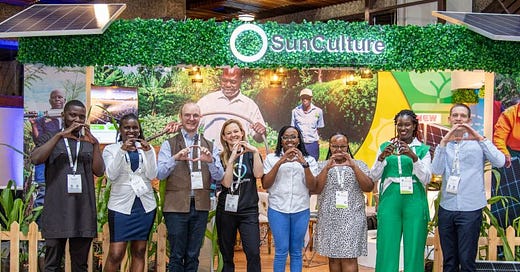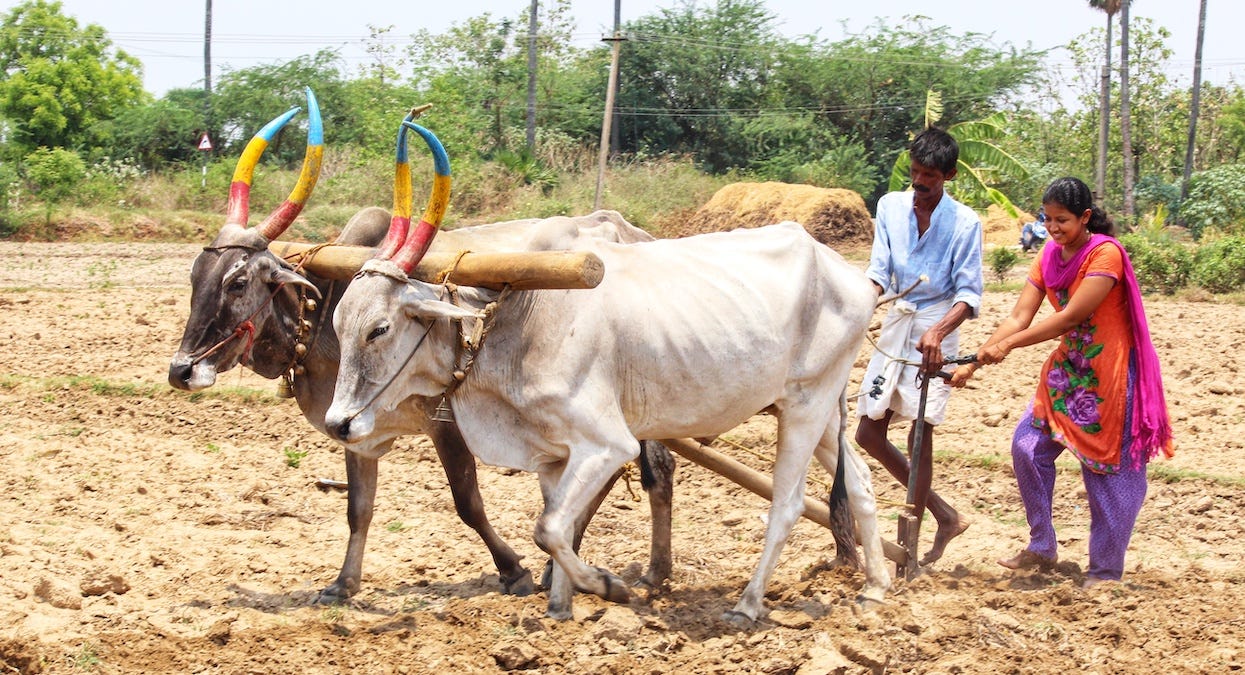Digital agriculture in LMICs - 13 Mar #81
AgriTechs from Vietnam to Kenya raise funding in excess of $90M across 6 deals
03/03/25
Vietnam’s Techcoop secures $70M Series A
Vietnam-based agritech Techcoop has raised USD 70 million in a Series A round, with USD 28 million in equity and USD 42 million in debt. This is the largest agritech investment in the country and one of the largest in Southeast Asia. The equity round was co-led by TNB Aura and AVV, with participation from BlueOrchard, FMO (the Dutch Development Bank), AppWorks, and Capria Ventures. Debt financing came from Vietnamese banks and international funds. The agritech, which focuses on high-value crops like cashew nuts, coconut, coffee, fresh fruits and vegetables, has a suite of solutions supporting financial services, traceability, agri advisory and market linkages. It plans to use the funding to strengthen its technology stack and expand its export infrastructure.
Source: Techcoop
Founded in 2022, Techcoop provides value chain digitalisation solutions to farmers, agribusinesses, farmer-owned cooperatives, input suppliers and financial service providers (FSPs). The company uses field and transactional data to monitor operations and provide services including data-driven credit to farmers (e.g. agri-inputs with 3-6 month payment terms), agribusinesses and cooperatives via its FSP partners. In a statement, Techcoop’s Co-Founder and CEO Hao Diep said that the with the new funding, the company aims to support 2,000 agri-SMEs, 50,000 farmer clubs, and 10 million smallholders. In March last year, as reported by ArisTechia, Techcoop raised USD 5 million in equity and debt from local banks. The agritech currently reaches over 200,000 farmers.
04/03/25
South Africa’s Khula! bags $6.7M Series A
South African agriTech startup Khula! has raised ZAR 126 million (USD 6.7 million) in Series A funding from investors including Absa Bank, which has a minority stake in the agritech, AECI, E Squared, and PepsiCo’s Kgodiso Fund. Established in 2016, Khula is a supply chain solution for emerging farmers connecting them directly to formal markets. It offers the Inputs App enabling farmers to buy 4,000+ products, from seeds to fertilisers. It also has a Trader App linking vetted farmers to major buyers, and the Money App, a financial platform to help small and emerging farmers access funding, manage payments, and facilitate transactions within Khula’s ecosystem. The new funding should boost Khula’s market presence, support innovation, and drive expansion. A second funding close is expected by the second quarter this year.
06/03/25
MapMyCrop gets $1.8M to bring precision agriculture to emerging markets
US-based agritech startup MapMyCrop has raised USD 1.8 million in a seed funding round led by YourNest Venture Capital, with participation from angel investors including Eaglewings Ventures.
The startup has a digital platform that combines satellite imagery, IoT and AI-driven insights to help farmers and enterprises monitor, predict and optimise crop health. With offices in India, the startup has data and insights in +80 countries, supporting the provision of precision agriculture services. As part of its growth strategy, it aims to grow a strong presence in emerging markets in Africa, Latin America and Southeast Asia. According to reports, the company is preparing to launch an AI-based farm credit score tool and a dedicated forest monitoring system.
07/03/25
India’s Varaha raises funding for carbon removal projects
Indian climatetech Varaha has raised a undisclosed multi-million US dollar investment from Conductor Capital, a UK-based investment manager specialising in energy, commodities, and environmental products. The funding will allow the company to expand its carbon projects and increase reach to a larger number of farmers across new geographies, with a primary focus on India and Nepal.
Photo credit: Acumen
Founded in 2022, Varaha designs and manages nature-based carbon initiatives across Asia and Africa, focusing on areas such as agroforestry, regenerative farming, and biochar initiatives. Using remote sensors, machine learning, and its mobile app, Varaha validates carbon credits through Puro.Earth, a global marketplace and standard for verified carbon removal credits. To date, the company has run 14 carbon removal projects in India, Nepal, Bangladesh and Kenya. The company states that it has to date transitioned +100,000 smallholder farmers to sustainable practices. In January, Varaha announced a large largest carbon offtake agreement for industrial biochar selling 100,000 credits to Google.
07/03/24
Innoterra acquires Fasal’s distribution network to grow agri e-commerce in India
Swiss-Indian agritech Innoterra has acquired the fresh produce distribution business of Fasal, an Indian precision agriculture and digital agriculture company. The acquisition gives Innoterra access to Fasal’s 85,000 acre farmer network in the regions of Bangalore and Chandigarh. The move is expected to strengthen Innoterra's B2B e-commerce platform Farmlink, especially in the fresh fruit sector. Farmlink is a B2B agri e-commerce that connects retailers and buyers in India with farmers and farmer collectives.
Innoterra was launched in 2020, and its key offerings are its output and input market linkage platforms including Farmlink and Innoterra's dairy subsidiary MilkLane. According to Crunchbase, it has raised to date USD 101 million in funding across three funding rounds. Established in 2018, Fasal has an IoT based AI-powered intelligence platform for horticulture crops that supports farmers source inputs, grow better crops using precision farming and sell produce. Following the acquisition, Fasal will focus on its precision agriculture technologies and on expanding farmer support initiatives.
11/03/25
Agros raises $4.25M to scale solar-powered irrigation in Southeast Asia
Singapore-based Agros Global, a provider of solar-powered irrigation solutions for the agricultural sector in Southeast Asia, has closed a USD 4.25 million Series A funding round to accelerate its expansion and innovation. The round was co-led by long-time investors Gaia Impact, Schneider Electric Energy Access Asia, and Wavemaker Impact, and saw the participation of the Global Innovation Fund (GIF) as a new investor. The investment follows a pre-Series A round of USD 2.7 million raised less than 2 years ago.
Founded in 2019, Agros has an app that provides farmers with real-time data and control over their irrigation processes, allowing them to monitor system performance, schedule irrigation cycles, and receive timely notifications about maintenance needs. The solution removes fuel expenses while avoiding CO₂ emissions. Agros has operations in Indonesia, Cambodia, and Myanmar. To date, it has supported more than 6,000 smallholder farmers, reaching 30,000 members of the farming community. By 2027, the company aims to partner with 30,000 farmers. Its target market is small to medium-sized fruit farmers (1-5 hectares) and small vegetable and fruit farmers (1-2 hectares).
In other news:
28/02/24
SunCulture secures additional $4M from BII
Kenya-based SunCulture, an agritech company that provides solar-powered irrigation systems, has raised an additional USD 4 million from British International Investment (BII), the UK’s development finance institution. This investment builds on BII’s previous support in 2023, which enabled SunCulture to distribute 9,000 solar irrigation systems to farmers across Kenya. It is intended to support new initiatives like a new carbon financing scheme designed to lower upfront costs for farmers. In April last year, the company completed an oversubscribed USD 27.5 million Series B fundraise.
Photo credit: Empower Africa
Founded in 2013, SunCulture provides end-to-end support to farmers using its irrigation kits, including financing, installation, maintenance and advisory services. SunCulture’s solar pumps are brought to market at a cost that is estimated to be 40-60% lower than the cost of a fuel-based pump. The majority of farmers using SunCulture’s systems, which support remote monitoring and predictive maintenance, are smallholders owing 1-3 acres and relying on rainfed agriculture.
05/03/25
Good reads: New article outlines PxD’s take on “impact at scale”
Precision Development (PxD), a global nonprofit organisation that supports smallholder farmers, has published a blog detailing its learnings on scaling digital innovations. In the blog written by Jonathan Lehe< Chief Strategy Officer, outlines the organisations approach to scale impact through strategic partnerships and sustainability. A key driver is PxD’s Build-Operate-Transfer (BOT) model, which supports the transition of projects to government partners once they have been successfully scaled. According to PxD, this approach has already allowed seven million “graduated” farmers in India and Pakistan. These are farmers that continue benefiting from PxD’s services without its direct involvement or any philanthropic funding.
As a result, the company highlights that its base of “current users”, as in the farmers that it directly reached by itself, dropped from 5.6 million in 2022 to 2.6 million in 2023, while its own headcount contracted from more than 100 staff to 50. PxD states that this approach has allowed it to focus on developing new products and services, and launching in new geographies in 2023 and 2024. Key to this approach is the collaboration with governments and organisations that already work with farmers. For instance, since 2017, it has teamed up with the Ethiopian Agricultural Transformation Institute (ATI) and social enterprises One Acre Fund, to strengthen their digital agriculture services.
Source: PxD
In the blog, PxD underscores the importance of agility in ensuring its own sustainability, continuously refining its approach based on real-world feedback. PxD outlines how it has grown from less than 30,000 farmers in 2016 to over 18.5 million farmers in 2024, with only incremental increases in resources. This is due to its focus on developing mobile-enabled digital tools that are highly customised to local needs, but that can reach large numbers of people at a low marginal cost per additional user. The organisation states that its cost per user has dropped sharply, from over USD 40 per year in 2016 to under USD1 in 2024.







